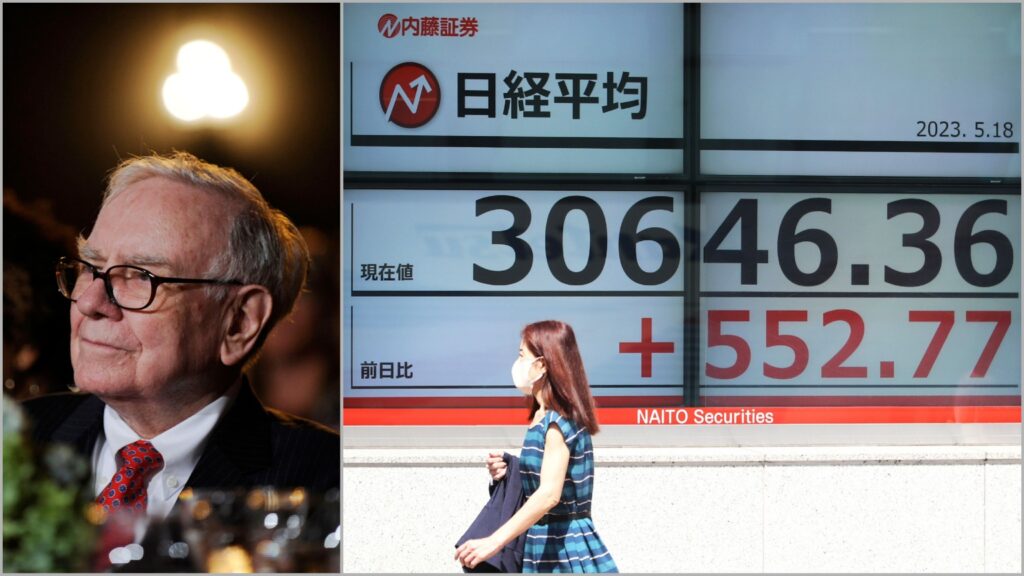
Overseas investors’ net buying surge after Buffett visits Japan, stocks hit 33-year high after bubble collapse.
Although it is attractive to good performance, low interest rates, and shareholder-friendly policies, the key is whether it will lead to wage and price hikes and a return to growth.
Japan’s Tokyo Stock Exchange’s Nikkei Index hit another high in 33 years after the bubble burst.Major indexes of the Tokyo Stock Exchange in Japan, including the Nikkei 255, have been breaking their highest record in 33 years since the bubble burst. This is thanks to foreign investors flocking after Warren Buffett, the “investment genius,” visited Japan last month and authorized them to invest in Japan. They pay attention to the good performance of Japanese companies, low procurement rates, and the possibility of the Japanese economy emerging from a 30-year long-term slump.According to the Nihon Keizai Shimbun on the 30th, foreign investors recently bought a net 5.6 trillion yen (about 52.878 trillion won) worth of Japanese stocks from early April to the third week of May. It is faster than the early days of “Abenomics.” “Foreign investors’ interest in Japan has never been so high in the past decade,” said Masamichi Adachi, chief economist at UBS Securities, who visited about 40 investment destinations in Europe and the United States this spring.The ‘buffet effect’ is the primary factor that led to the ‘buy Japan’ of foreign investors. In April, Buffett announced that he visited Japan and increased the share of Japanese trading companies’ stocks, including Itochu Corporation. Earlier this month, at Berkshire Hathaway’s annual shareholders’ meeting, “Japan is a better investment destination than Taiwan.” “We will look for investment destinations for Japanese companies,” he said.Nihon Keizai said that foreign investors who reevaluate the Japanese stock market like Buffett are spreading to Europe and other countries, calling them “mini Buffett.” French operator Karminak recently bought shares of Japanese electricity and automobiles. James Salter of Zeno Asset Management in Britain, who has invested in the Japanese stock market since 1989, set up a new Japanese fund in April and raised 25 million in a short period of time. It plans to raise the fund to up to 1 billion due to a series of inquiries.
Why is Japan, which has been stagnant for 30 years, drawing attention again. First of all, long-term low yen has led to a significant increase in profits at major conglomerates. Over the past decade, the earnings growth rate per share of the Nikkei index has more than tripled and more than doubled that of the top 500 U.S. companies. Low procurement costs are also attractive. The U.S. and Europe raised their key interest rates sharply last year, while Japan continues its monetary easing policy, allowing it to raise investment cheaply.
The active introduction of shareholder-friendly policies is also a factor in the revaluation of the Tokyo Stock Exchange. Early last month, the Tokyo Stock Exchange sent an official letter to listed companies asking them to disclose and implement measures to raise the stock price level for listed companies with a PBR of less than one time. Less than 1x PBR means that the market capitalization is lower than the liquidation value. In response, large companies such as Mitsubishi Corp. and Fujitsu announced their treasury stock purchase or dividend policies. Due to the influence of the corporate governance improvement system introduced during the Shinzo Abe administration, the activities of “activist funds” that actively intervene in management to improve shareholder value have also increased significantly. Recently, these funds have also called for the replacement of poor management. What foreign investors are paying the most attention to is whether the Japanese economy will return to its growth trajectory from a long-term recession. Prices, which have been in place for 30 years since last year, are rising. Thanks to pressure from Prime Minister Fumio Kishida, labor-management wage negotiations concluded this spring at the highest rate in 30 years. “We cannot deny the possibility that the Japanese economy will wake up due to wage hikes and inflation,” said Karminak’s head of asset management. A Japanese stock manager at GMO, a large U.S. management company, also predicted that “the wage hike will lead to an increase in consumption and facility investment.”
However, it is too early to be sure that the Japanese economy will enter a full-fledged growth trajectory, so many say that it remains to be seen how long foreigners’ “buy Japan” will last. Long-term investors, including pension funds, are expected to join the current overseas buying spree, which focuses on short-term funds, only after long-term confidence in the Japanese economy is restored.
Sophia Kim
US ASIA JOURNAL



